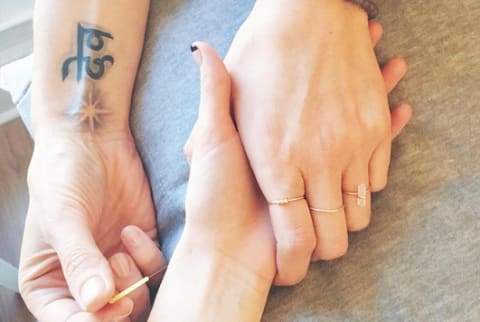Advertisement
5 Acupuncture Myths We All Need To Stop Believing: A Doctor Explains


When I meet someone new, they usually ask me what I do. My standard answer is “I am an integrative medicine doctor who combines functional medicine, acupuncture, and nutrition to get to the root of people’s problems.”
When they hear I do acupuncture, their eyes widen in surprise, and I often get a million questions. I get it. People are curious, and it's a relatively new medical treatment within the scope of Western medicine. Add to that the fact that I look like the complete opposite of a traditional Chinese medicine doctor, and it tends to pique people’s interest.
Although acupuncture has been around for almost 4,000 years, it remains a mystery to most Americans. That's why I'm sharing the top five myths about acupuncture—and explaining what you should really know:
Myth #1: Acupuncture hurts.
I mean, you’re using needles right? Yes...and no. The needles we use in acupuncture are miniature versions of the ones used to draw your blood at the doctor’s office. They are about the size of two to three human hairs. Sometimes you may feel an initial prick, which fades away in seconds. Most of the time you don’t even realize you have a needle in your body—unless you decide to start doing jumping jacks all of a sudden (not recommended).
Myth #2: Acupuncture is only for “hippies."
I don't mean this as an offense to hippies (especially since I consider myself one!). Acupuncture is for everyone. You would actually be surprised how many people are getting regular treatments but keeping it a secret. I've treated everyone from the CEO of a major company to the local school teacher. Ask your friend, co-worker, or family member if they have ever tried acupuncture. You'll probably find that the answer is often yes.
Myth #3: Acupuncture only treats pain.
It’s true that acupuncture helps with pain, especially joint, back, headaches, and menstrual cramps. There is an abundance of research to back up its effectiveness for pain. However, I've also successfully helped manage many other conditions using acupuncture, including nausea, allergies, anxiety, depression, hypertension (high blood pressure), and fibromyalgia, among others.
Myth #4: Acupuncture is just a placebo effect.
Actually, this may be true to some extent. However, if you feel better, do you really care why?
Still, it's mostly a myth, as numerous studies of acupuncture have shown that our brains release chemicals like endorphins (natural painkillers) and substance P (calms overactive nerves) along with additional anti-inflammatory effects on the body.
Myth #5: Acupuncture is addictive.
People tend to think that once you start acupuncture you'll always need it in order to feel good. In fact, for the majority of illnesses, the goal is to treat the acute problem so that you don’t need an endless number of treatments. However, for people with chronic conditions, it's often extremely useful to have a maintenance acupuncture schedule to help keep problems under control.
Related reads: